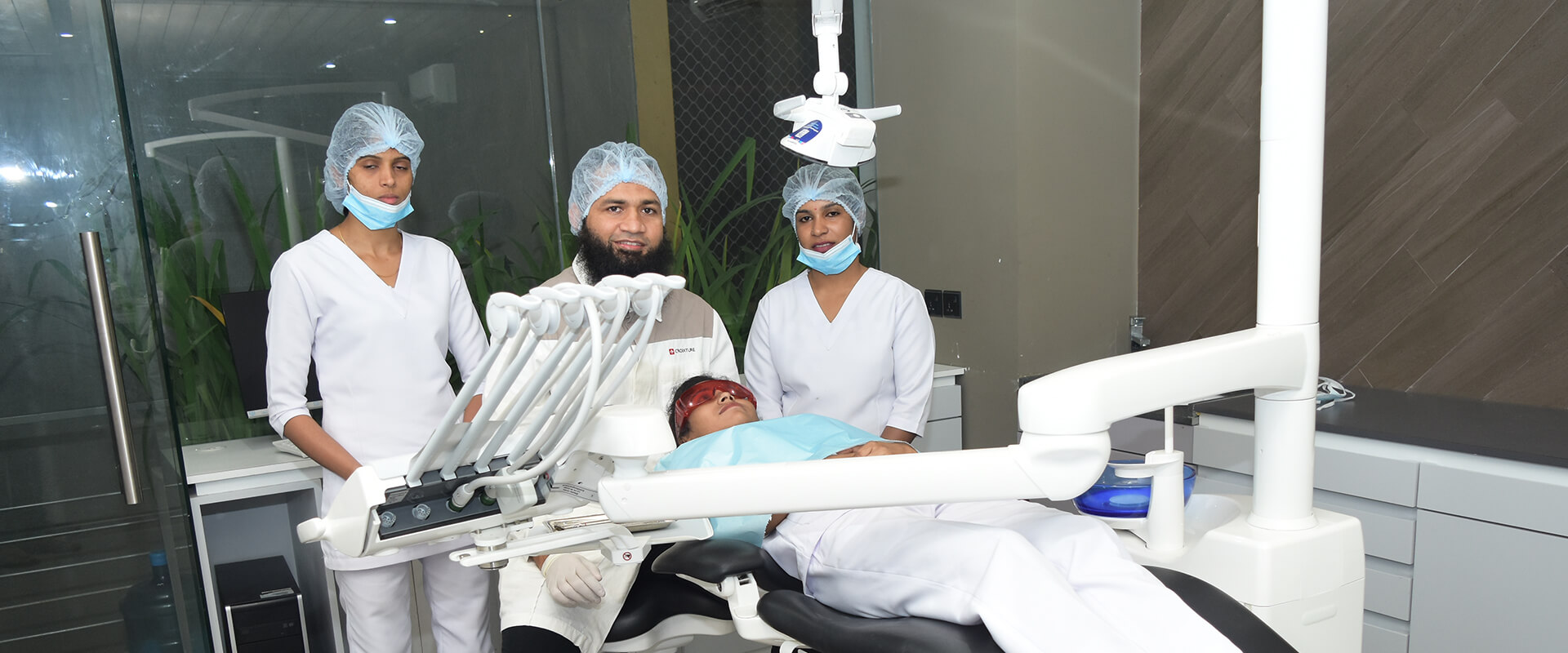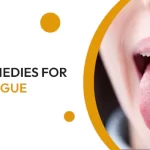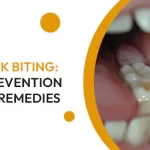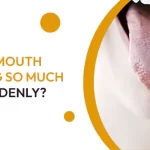What is sleep apnea? Symptoms and exercises to fix this problem
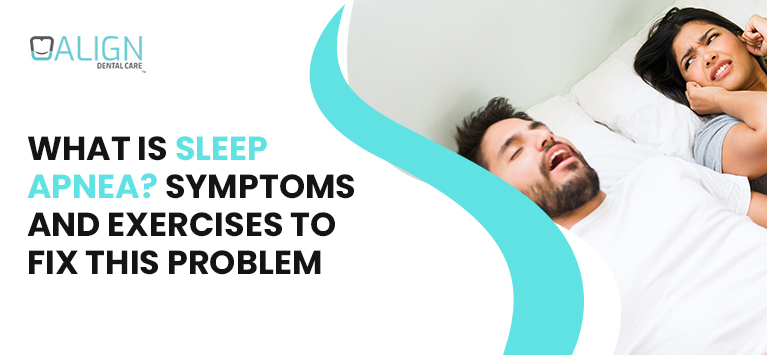
Sleep apnea is a condition where the person’s breathing stops or repeatedly starts during sleep. You may experience daytime sleepiness and loud snoring.
People with sleep apnea are most likely to have obstructive sleep apnea.
This usually occurs when the upper airway is blocked. The second type of sleep apnea, called central sleep apnea, is caused by a problem with the nervous system. This can happen briefly, but it will repeatedly occur in sleep. They may then snort or take deep, shallow breaths.
Untreated sleep apnea can causes complications like heart disease or depression. You may feel drowsy, and this increase your risk of being involved in an accident while driving or at work.
Read More…All you need to know about tooth nerve damage
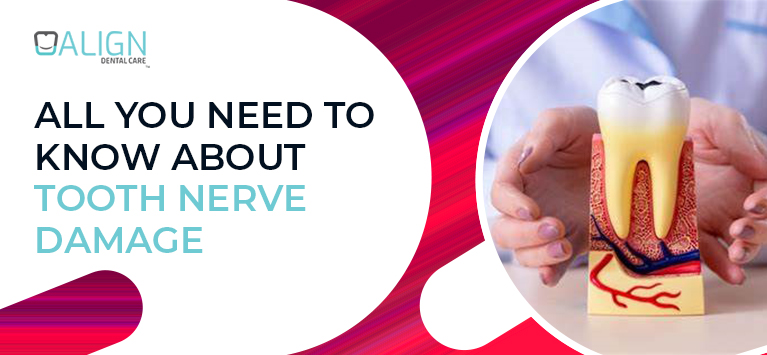
The nerves of a tooth are located in a vascularized connective tissue called pulp chamber in the centre of a tooth. Damage in the nerves surrounding a tooth is due to dental trauma or improper dental procedures; its aftereffects like burning sensation, numbness, and others are either temporary or permanent.
How does tooth nerve damage happen?
Unexpected dental injuries like deep cracks that extend to a tooth’s pulp chamber and constant pressure from teeth grinding and clenching expose the injured tooth’s nerve endings. Thus various external stimuli acquire a way to access the tooth nerves. They frequently strain, irritate the nerves and eventually lead to severe damage to the nerve fibres.
On rare occasions, badly executed dental operations like putting fillings close to the nerve endings, placing implant posts longer than they should be, and faulty pulp chamber closure during endodontic procedures can also damage a tooth’s nerves.
Read More…What everybody ought to know about dental fissure sealants?
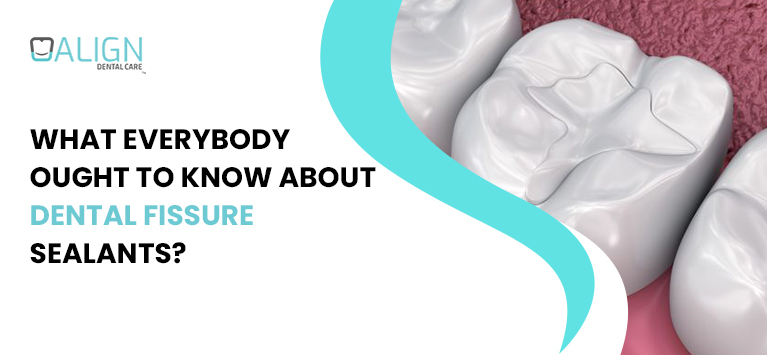
Dental fissure sealants are clear composite resins and are primarily made up of glass ionomer. These sealants are used as a preventative dental treatment to protect molar and premolar teeth from developing pits & fissure cavities.
When you look at your molar teeth, they have groovy lines called fissures. Simultaneously, pits are also present. Such pits and fissures form the chewing surfaces of molar teeth. The deep grooves allow the food particles stuck and accumulate there. Meanwhile, the base of those grooves is inaccessible to toothbrush bristles.
In such cases, food debris and microbes pile up, followed by causing plaque build-up, cavities, etc. The pits and fissures increase the risk of cavities however impeccable your oral hygiene activities are.
This is where fissure sealants are required. The role of this thin coating material in safeguarding our teeth is explained in this blog article.
Read More…Dental cysts – Everything you need to know
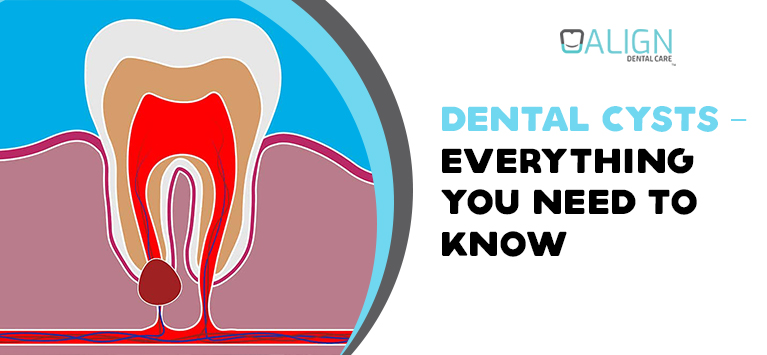
Dental cysts are defined as closed cavities filled with a fluid-like material. Such fluid-filled sacs are typically formed and develop gradually around the jaw bone, and gums near the crown of a partially erupted tooth, especially molars and canines.
Teeth are more delicate in their development stage than erupted teeth, making the unerupted teeth more susceptible to dental cysts.
Even though dental cysts are harmless in most cases, they will lead to serious complications if the closed-off cavities (cysts) remain untreated. It is asymptomatic in its initial stages but it exhibits a variety of symptoms when the cysts grow more than 2 centimeters in diameter.
Read More…What is meant by Socket Bone Grafting?
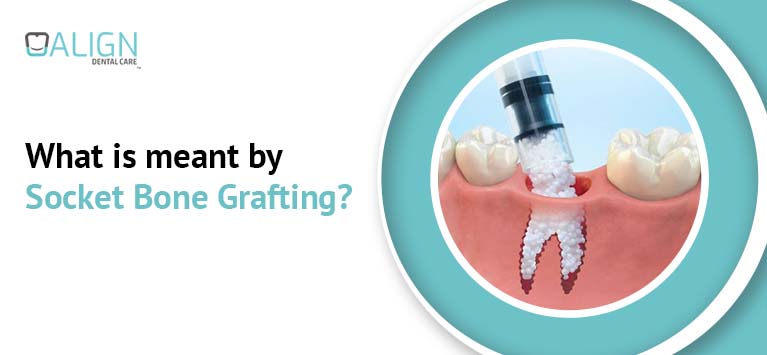
Socket graft (or) Socket preservation graft is a form of dental bone grafting procedure. It is used to protect the empty socket after extracting a tooth. The socket is a bony crypt in the jaw surrounded by connective tissues to anchor a tooth. When a tooth is removed surgically, the bone around the empty socket gradually deteriorates, causing jaw bone loss.
Socket preservation is designed to protect and even rebuild the bone in such empty tooth sockets.
Read More…6 relaxation techniques to reduce pain in your jaw
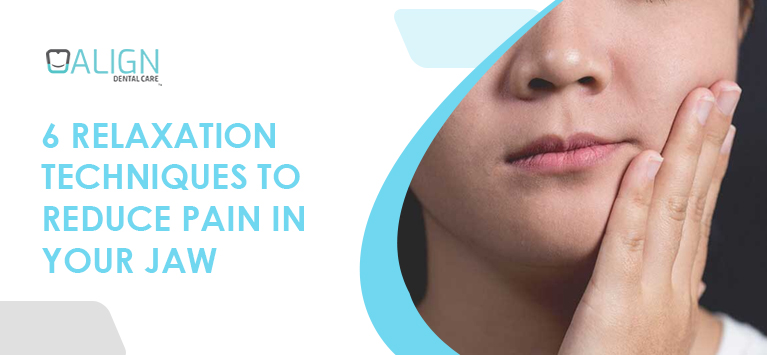
Pain, soreness, or tightness in the jaw is a brutal thing. They cause much discomfort and make regular oral activities such as chewing, swallowing, and even opening/closing moth a tedious thing. Stretching your jaw too much is the root cause of such problematic conditions in the jaw whereas numerous factors push everyone to stretch their jaw excessively.
Once the underlying cause is identified, you can get the right solution to get rid of the jaw pain. Until you visit your dentist, various relaxation techniques will provide you with short-term relief.
Here our dentists have explained some effective ways to relax your jaw muscles to get jaw pain relief for a short while.
Read More…How do smokeless tobacco products affect your dental health?
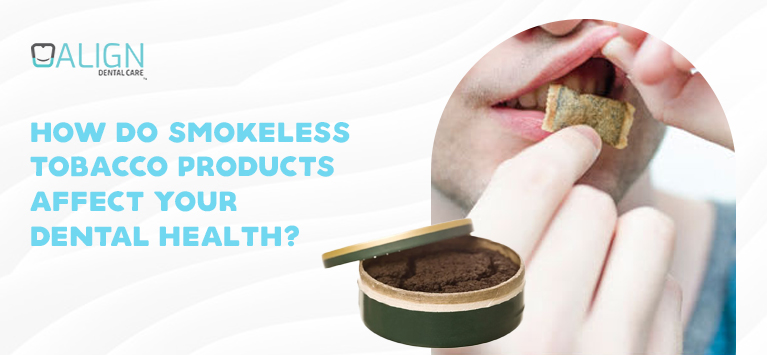
“Chewing tobacco is not additive like Cigarettes”, “Smokeless tobaccos are not much worse because we do not inhale it”
Do you believe these things? If Yes, this post is for you, friend. These are the common misconceptions regarding smokeless tobacco. If you don’t smoke cigarettes but consume smokeless tobacco like snuff, snus, dip, gutka, mawa, tobacco gum, or other forms, they also have a wreck on your health. Your dental health is not an exception.
Our dentists have explained chewing tobacco’s havoc on your oral cavity. Keep reading.
Read More…If you neglect jaw dislocation now, it will hurt you later
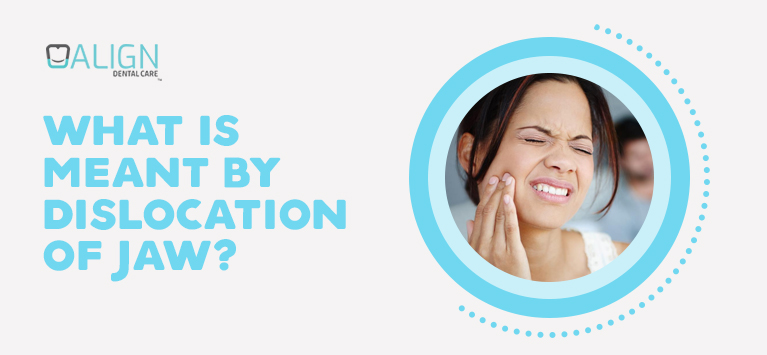
Jaw dislocation or dislocated jaw happens when the lower part of the jaw moved out of its normal position. The lower jaw, also known as Mandible, forms the lower part of our skull and is connected with four muscles namely masseter, temporal, medial pterygoid, and external pterygoid. Each muscle occurs in pairs and each one of them appears on either side of the skull. This joint is termed as Temporomandibular Joint (TMJ) that allows jaw bone movement from side to side.
When the joint is mutilated due to facial injuries or accidents, it will either get fractured or dislocated. Sometimes, the dislocated mandible occurs when a person opens his/her mouth too wide. You might read a lot of things about a broken or fractured jaw.
In this article, we have highlighted jaw bone dislocation.
Read More…What everybody ought to know about tongue ulcers?
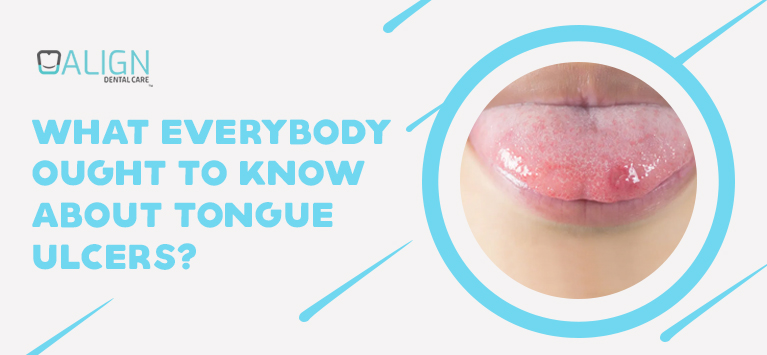
Tongue ulcer also termed as sores on the tongue are open cuts that appear as whitish lesions on the tongue. This is one of the common types of canker sores that appear inside our mouth. It is a common oral problem and subsides on its own but stimulates sharp pain while eating and drinking.
Despite it appears harmless and occurs for an unknown cause, it is linked to various irritants at times. It can be identified with certain symptoms. Keep reading to know more about this.
What causes Tongue ulcer?
The root cause of tongue ulcers is unknown. However, dentists believe it happens as a consequence of viral infections, certain medical conditions, and traumatic conditions. The possible attributes that trigger sores on our tongue include:
- Infectious conditions
- Oral thrush
- Oral Lichen Planus
- Herpes
- Gingivostomatitis
Bodily disorders
If a person has ulcer lesions in various areas of his/her mouth, it may occur due to a disturbance in the victim’s physical health. In simply, too many sores or rashes in the mouth are a sign of an underlying problematic condition. The important ones to mention are:
- Autoimmune diseases
- Crohn’s disease
- Diabetes
- Behcet’s Syndrome
- Inflammatory Bowel disease
Traumatic conditions
Apart from the microbial invasions and bodily disorders, the tongue ulcers emanating from injuries or damages in the mouth that occur due to
- Accidental tongue bites
- Irritations from dental braces or restorative appliances
- Irritations from certain medications
- Oral tissue injuries due to vigorous brushing or flossing
Taking too much spicy foods and consuming hot foods are also responsible for soft tissue injuries that lead to tongue ulcers.
What are the symptoms of tongue ulcers?
The tongue sores caused by mouth ulcer or canker sores are whitish or yellowish lesions with red-colored borders. Mostly, the tongue ulcers are tiny-sized wounds whereas some ulcer tongue lesions are sized between 1 to 3 cm.
As they are painful lesions, the tongue ulcer is accompanied by difficulties in eating along with certain oral hardships as follows:
- Difficulty in swallowing
- Swollen tongue
- Bleeding
In the meantime, a person encounters various hassles in his/her body systems along with mouth ulcers if it happens due to the underlying disorders. Here are some signs:
- Chronic fever
- Body aches
- Diarrhea
- Swollen lymph nodes
- Rashes in the skin
What are the tongue ulcer treatments a dentist provides?
Remember that the tongue sores or ulcer tongue lesions will go on their own in a few days if it occurs due to oral infections. We recommend OTC medications to get relief from the pain and discomforts caused by the tongue sores.
In contrast, if you notice the mouth sores exist for many weeks, consult your dentist. We have noticed that various medical conditions obstruct the ulcer lesions from subsiding. In such circumstances, treating such underlying cause will help you to get rid of the tongue ulcers.
You can also get rid of the painful lesions and quicken the healing process with some natural remedies.
Want to know more about tongue ulcer and DIY remedies to get relief from this problem? Contact our dentists. Our Align Dental Care is ready to help.
Why do you feel sharp pain while swallowing?
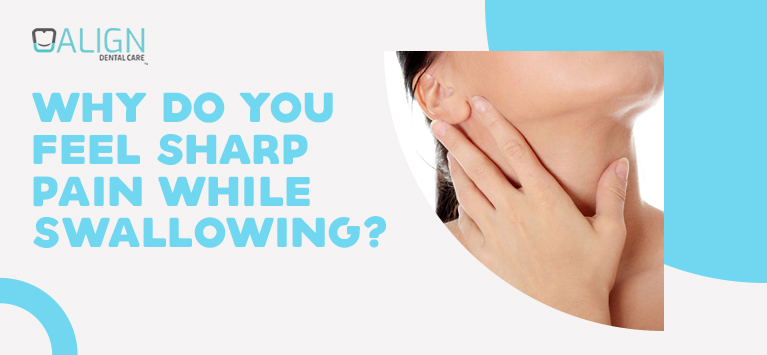
Painful swallowing happens due to various reasons. The main culprit to mention is, our fast-paced lifestyle. As we eat too much food at once so that we do not chew foods properly. Despite it looks common and harmless, it engenders difficulties in swallowing over time. Clinicians refer such pain and other difficulties in swallowing as “Dysphagia”.
The ingested food particles move into a part of the throat called the pharynx. Then the chewed foods pass to the stomach and other parts of the digestive tract through the esophagus. If there is any glitch in this path, you will have swallowing difficulties.
Besides gulping, aging is the main thing that triggers dysphagia. On the other hand, various health conditions lead to this problem.
How is dysphagia categorized?
Before seeing the painful swallowing instigating factors, you should know about dysphagia classifications. It is because the dysphagia is classified on how it is occurring so that the initiators also fall into one of those categories. This condition is primarily classified into 2 types:
- Oropharyngeal Dysphagia – It causes difficulty swallowing due to the problems in mouth or throat. Mostly, it occurs with throat muscle weakening thereby the foods cannot move into the throat and digestive tract.
- Esophageal Dysphagia – When a muscle in the body of the esophagus does not work properly, it also stimulates difficulty swallowing and is termed “Esophageal Dysphagia”.
Each type shows various signs and they vary for every individual. For instance, some people sense pain while swallowing solid foods but fluids do not cause any pain. In contrast, few persons encounter pain while drinking but have no trouble with solid foods.
What are the additional symptoms of dysphagia?
Apart from triggering pain when swallowing, you may have various difficulties as follows:
- Sense of something stuck in the breast bone
- Chronic heartburn
- Coughing while swallowing
- Food coming back up into the throat
- Sore throat
- Hoarsing
- Choking
What causes difficulty swallowing?
There are many reasons why you feel pain when swallowing. It occurs frequently or occasionally. The frequency depends on the severity of the underlying cause. Here are the primary factors you should know.
Oropharyngeal Dysphagia
As we have seen earlier, this kind of dysphagia happens with the weakening of throat muscles. Mostly, virus or bacteria infections, certain illnesses are responsible for this problem as listed below:
- Neurological damage – The structural or biochemical deviations in the central nervous system (nerves in the brain & spinal cord) are also a factor associated with dysphagia.
- Neurological disorders – People who are suffering from diseases caused by flawed neurological conditions such as Parkinson’s disease, Muscular dystrophy have difficulties in swallowing.
- Hypothyroidism – Swelling in the underactive thyroid gland due to which extra pressure is applied on the esophagus. It triggers pain and a feel like something is stuck in the throat.
- Zenker’s Diverticulum – It is a disastrous condition that causes a pouch of tissues in the throat. This makes the food particles stuck in the throat and is followed by causing infection, swelling, bad breath along painful swallowing.
Esophageal Dysphagia
The infection or damage in the esophagus hurts your swallowing by causing Esophageal Dysphagia. Here are some common and atypical things responsible for this condition:
- Acid reflux diseases – Chronic reflux of stomach acids would irritate your throat, cause scar tissue in the esophagus and even narrow down this muscular tube. Such esophageal damages can be identified with various abnormalities like painful swallowing.
- Esophageal tumors – The abnormal narrowing of the esophagus causes tumors in the food pipe and causes various difficulties. Difficulty swallowing is one of its impacts.
- Achalasia – Achalasia is a disorder that makes foods or liquids difficult to pass through the esophagus. The walls of esophagus for achalasia sufferers are weak thereby the foods and drinks they take come up back to the mouth.
- Foreign bodies – Foods and certain non-edibles can lodge in the throat and block it partially. In such cases, swallowing is difficult so that you may get an aching sensation. Denture wearers and people who have chewing difficulties are highly susceptible to this.
- Diffuse Spam – This is a problematic condition that affects involuntary muscles in the walls of our esophagus. It causes poorly coordinated contractions of the esophagus so that the sufferers develop intense pain while swallowing.
- Radiation therapy – Some people get affected by this condition due to the growth of cancer tumor cells and radiation treatments to rectify it.
- Scleroderma – It is a chronic but rare autoimmune disease that causes a ring-like structure to harden the tissues. It has a direct impact on the muscles in the lower esophagus and is followed by a sharp pain in the throat while swallowing.
Bottom line
Difficulty swallowing (or) Dysphagia is a common condition that can happen for people of all age groups whilst older adults are highly prone to this condition. Whatever your age is, if painful swallowing happens frequently and shows various abnormalities, consult your doctor or dentist immediately.
Based on the type of dysphagia you are suffering from, a clinician would prescribe you the right solution such as swallow strengthening exercises, medication, surgery, and others.
Read More…




